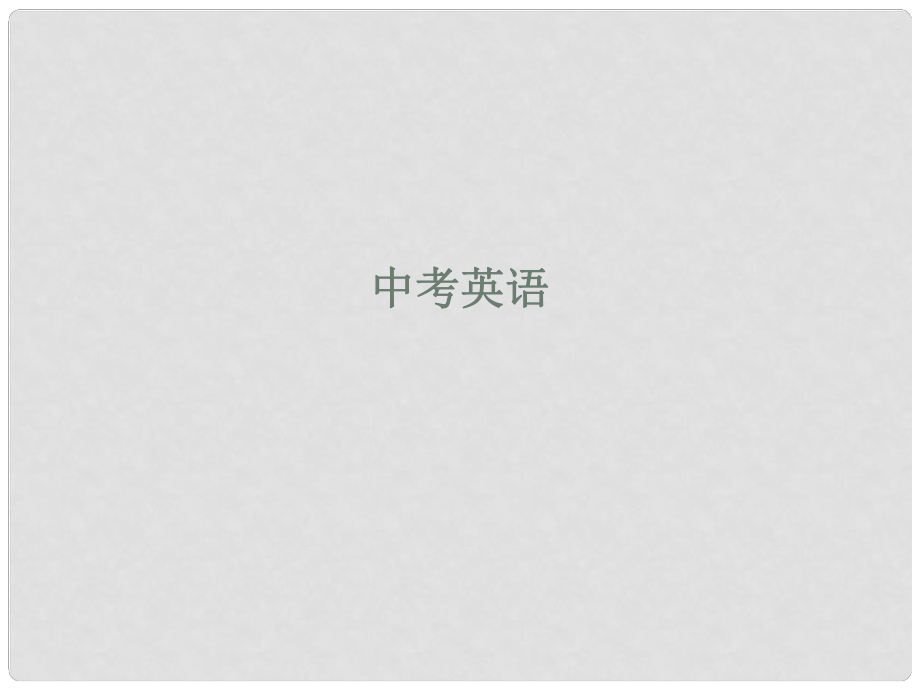《中考英語(yǔ) 語(yǔ)法沖刺復(fù)習(xí) 反意疑問(wèn)句與感嘆句課件》由會(huì)員分享����,可在線(xiàn)閱讀,更多相關(guān)《中考英語(yǔ) 語(yǔ)法沖刺復(fù)習(xí) 反意疑問(wèn)句與感嘆句課件(11頁(yè)珍藏版)》請(qǐng)?jiān)谘b配圖網(wǎng)上搜索�����。
1、中考英語(yǔ)中考英語(yǔ)語(yǔ)法復(fù)習(xí):反意疑問(wèn)句與感嘆句語(yǔ)法復(fù)習(xí):反意疑問(wèn)句與感嘆句一����、考點(diǎn)測(cè)試( ) 1. They came here to have a meeting on time, _?A. didnt theyB. did theyC. dont theyD. do they( ) 2. Tom will come here on time, _?A. wont heB. will he C. doesnt heD. does he( ) 3. Kate didnt go to school yesterday, did she? _, though she did not feel ver
2、y well.A. Yes, she did B. Yes, she didnt C. No, she didnt D. No, she did( ) 4. There are no museums in our city, _?A.arent thereB. are thereC. is thereD. isnt there( ) 5. I think the book is worth reading, _?A. is it B. isnt itC. do I D. dont I ( ) 6. Jim has a beautiful toy, _?A. has heB. hasnt heC
3���、. is he D. isnt he( ) 7. If you need help, let me know, _?A. will you B. will I C. do I D. do you( ) 8. They have never seen the film, _?A.havent theyB. have theyC. do they D. dont they AAACBBBB語(yǔ)法復(fù)習(xí):反意疑問(wèn)句與感嘆句語(yǔ)法復(fù)習(xí):反意疑問(wèn)句與感嘆句( ) 9. Lets help each other and learn from each other, _?A. shall weB. will yo
4����、uC. dont youD. do you( ) 10. _ wide the streets are!A. What B. HowC. What a D. How a ( ) 11. _ exciting sport it is to climb the mountains!A. What B. HowC. What an D. How an ( ) 12. _ interesting talk Mr. Black gave us! Yes. We all like it very much.A. How B. What aC. What anD. What( ) 13. An earthq
5�、uake hit Chile on February 27th, 2010. _ terrible news!A. What B. What a C. How D. How a ( ) 14. _ beautiful flowers! Who sent them to you? Ah, its a secret.A. What B. What aC. How D. How a ( ) 15. Have you seen the film Alice in Wonderland? Yes. _ wonderful the film is!A. What B. HowC. What aD. How
6、 a ABBABAC語(yǔ)法復(fù)習(xí):反意疑問(wèn)句與感嘆句語(yǔ)法復(fù)習(xí):反意疑問(wèn)句與感嘆句二���、考點(diǎn)精講精練考點(diǎn)1:反意疑問(wèn)句反意疑問(wèn)句是前一部分陳述一件事實(shí)����,后一部分對(duì)陳述提出相反的疑問(wèn)的一種問(wèn)句形式����。如:反意疑問(wèn)句主要考的是后句的助動(dòng)詞以及主語(yǔ)的選用�。(1). 后句助動(dòng)詞選用前句用什么助動(dòng)詞�����,后句就用什么助動(dòng)詞�����;若前句用的是be動(dòng)詞, 則后句助動(dòng)詞用be; 若前句用的是實(shí)義動(dòng)詞, 則后句助動(dòng)詞用do, dont, does, doesnt, did, didnt��。如:He can swim at the age of ten, cant he? 他10歲時(shí)會(huì)游泳���,是不是?(前句助動(dòng)詞是can, 后句用相應(yīng)
7��、的cant)Anna wasnt writing a letter at 8:00 last night, was she? 安娜昨晚8點(diǎn)時(shí)不在寫(xiě)信���,是不是����?(前句助動(dòng)詞是wasnt (be), 后句用相應(yīng)的was)語(yǔ)法復(fù)習(xí):反意疑問(wèn)句與感嘆句語(yǔ)法復(fù)習(xí):反意疑問(wèn)句與感嘆句You often go to the park to take a walk, dont you? 你常常去公園散步�����,是不是?(前句動(dòng)詞是go (實(shí)義動(dòng)詞), 后句用相應(yīng)的dont)(2). 后句主語(yǔ)選擇. 前句主語(yǔ)是代詞�,后句就用該代詞,并與前句在人稱(chēng)和數(shù)上保持一致����;如前句主語(yǔ)是名詞,則要變?yōu)橄鄳?yīng)的代詞���。如:She goe
8�����、s shopping once a week, doesnt she? 她一個(gè)星期去購(gòu)物一次����,是不是����?(前句主語(yǔ)是代詞she, 后句也要she)Lily didnt help to fix up the broken bike, did she? Lily沒(méi)幫忙修補(bǔ)爛單車(chē),是不是�����?(前句主語(yǔ)是名詞Lily, 后句要變?yōu)橄鄳?yīng)的代詞she). 前句的主語(yǔ)是句子�����,不定式,動(dòng)詞ing形式時(shí)��,后句主語(yǔ)用it����。如: What you need is more important, isnt it? 你所需要的更重要�����,是不是�����? To see (Seeing) is to believe (believing
9����、), isnt it? 眼見(jiàn)為實(shí),是不是��?. 前句主語(yǔ)是everything, anything, nothing, something時(shí)����,后句主語(yǔ)用it���。如: Everything is ready, isnt it? 一切都準(zhǔn)備好了,是不是�?語(yǔ)法復(fù)習(xí):反意疑問(wèn)句與感嘆句語(yǔ)法復(fù)習(xí):反意疑問(wèn)句與感嘆句. There be 句型的反意疑問(wèn)句,后句主語(yǔ)用there�。如: There is little ink in your pen, is there? 你的筆里沒(méi)有墨水,是不是�? There will be an important football match today, wont ther
10、e? 今天有一場(chǎng)重要足球賽�����,是不是���?(3). 幾種?�?嫉姆匆庖蓡?wèn)句. 前肯后否You are in Class One, arent you? 你在一班�,不是嗎�����?Jim will go to Japan, wont he? 吉姆將要去日本���,不是嗎�?My mother watered all the flowers the day before yesterday, didnt she?我媽媽前天澆完所有的花,不是嗎����?. 前否后肯Simon isnt an English boy, is he? 西蒙不是一個(gè)英國(guó)男孩,是不是��?Nick hasnt got the bad news, has he
11�、? 尼克還沒(méi)聽(tīng)到那個(gè)壞消息�,是不是?He doesnt need to go there on time, does he? 他不需要準(zhǔn)時(shí)去那里���,是不是�����?. 前句中有否定詞(no, never, hardly, few, little, nothing, nobody, seldom等)時(shí)��,后句用肯定����。語(yǔ)法復(fù)習(xí):反意疑問(wèn)句與感嘆句語(yǔ)法復(fù)習(xí):反意疑問(wèn)句與感嘆句She is never late for school, is she? 她從來(lái)都沒(méi)有遲到過(guò)�,是不是?Nobody wants to go there, does he? 沒(méi)有人想去那里����,是不是����?Peter hardly had time
12�、 for concerts at that time, did he? 在那時(shí)Peter幾乎沒(méi)時(shí)間去聽(tīng)演唱會(huì),是不是����?. 祈使句的反意疑問(wèn)句除了Lets 開(kāi)頭用shall we外,其他的可以用will you (前句可肯定也可否定)或wont you (前句肯定)�����。 Lets climb the tree to pick the apples, shall we? 讓我們爬上樹(shù)去摘蘋(píng)果����,好不好? Let us go home on foot, will you? 讓我們走路回家���,好嗎��? Open the door, will you (wont you)? 打開(kāi)門(mén)��,好嗎��? Dont play
13��、football near the river, will you? 不要在河邊踢足球��,好不好�?. 含有賓語(yǔ)從句的反意疑問(wèn)句 一般情況下,后半句的反意疑問(wèn)句的助動(dòng)詞及主語(yǔ)只與主句有關(guān)���。如: He wonders how old the girl is, doesnt he? 他想知道那個(gè)女孩子多大了����,是不是�����? You havent decided who will go with you, have you? 你還沒(méi)決定誰(shuí)和你去�����,是不是���? 語(yǔ)法復(fù)習(xí):反意疑問(wèn)句與感嘆句語(yǔ)法復(fù)習(xí):反意疑問(wèn)句與感嘆句但若主句的主語(yǔ)是第一人稱(chēng)(I, we),動(dòng)詞是think, believe, suppose等時(shí),后
14���、半句的助動(dòng)詞及主語(yǔ)與從句有關(guān)��,但后句是肯定還是否定��,與整個(gè)前句有關(guān)����。如: I think Mary is coming tomorrow, isnt she? 我認(rèn)為瑪麗明天會(huì)來(lái),不是嗎�����? We dont believe he is a thief, is he? 我們都認(rèn)為他不是一個(gè)賊��,是不是�����?(4). 反意疑問(wèn)句的回答前肯后否的回答與一般疑問(wèn)句回答一樣�����。如:He has been to Kunming, hasnt he? 他去過(guò)昆明�,是不是?Yes, he has. He went there last year. 是的,他去過(guò)����,他去年去了那里。No, he hasnt. 不�����,他沒(méi)去過(guò)��。
15����、. 前否后肯的回答要注意Yes和No的意思要反過(guò)來(lái)。She isnt a teacher, is she? 她不是老師����,是不是��? Yes, she is. She is an English teacher. 不����,她是。她是一位英語(yǔ)老師����。No, she isnt. She is a reporter from CCTV. 是����,她不是�����。她是一位來(lái)自CCTV的記者�。語(yǔ)法復(fù)習(xí):反意疑問(wèn)句與感嘆句語(yǔ)法復(fù)習(xí):反意疑問(wèn)句與感嘆句答句選Yes,還是選No有巧門(mén):?jiǎn)柧渑c答句關(guān)鍵詞相同,則用Yes, 關(guān)鍵詞不同則用No�。如上例中問(wèn)句的關(guān)鍵詞是teacher, 答句有也有teacher的那句選用Yes回答;答句中
16�����、關(guān)鍵詞是reporter的那句選用No回答�����。 考點(diǎn)2:感嘆句 感嘆句用來(lái)表示強(qiáng)烈的感情����,句末多用 “!”�����。句子結(jié)構(gòu)如下: (1). 感嘆句的句式. What + a/an + (形容詞) +可數(shù)名詞單數(shù)+ (主謂)+其他!What a good bird it is! What an exciting match it is! . What + (形容詞) +不可數(shù)名詞(可數(shù)名詞復(fù)數(shù))+ (主謂)+其他���!What bad weather today is! What sweet flowers he sent to me yesterday!. How + 形容詞/副詞+(主謂)+其他����!How
17�、 well the girl sings! How tall the tree is! How hard he studies!語(yǔ)法復(fù)習(xí):反意疑問(wèn)句與感嘆句語(yǔ)法復(fù)習(xí):反意疑問(wèn)句與感嘆句(2). What和How 選用判斷感嘆句的引導(dǎo)詞是What還是How。先把主謂+其他部分去掉��,看最后一個(gè)詞是名詞用what���,是形容詞或副詞用how�����。若沒(méi)有主謂則看句末一詞而定����。句末一詞是名詞用what�����,是形容詞或副詞用how����。What a fat duck it is! (主謂是it is, 把它們?nèi)サ簦詈笠辉~是duck, 名詞���,故用What) How fast the cat runs to catch the mouse! (主謂是the cat runs, 把它們及其他去掉���,最后一詞是fast, 副詞,故用How)What helpful inventions! (本句沒(méi)有主謂�����,最后一詞是invention, 名詞�,故用What)The endThank you
 中考英語(yǔ) 語(yǔ)法沖刺復(fù)習(xí) 反意疑問(wèn)句與感嘆句課件
中考英語(yǔ) 語(yǔ)法沖刺復(fù)習(xí) 反意疑問(wèn)句與感嘆句課件

